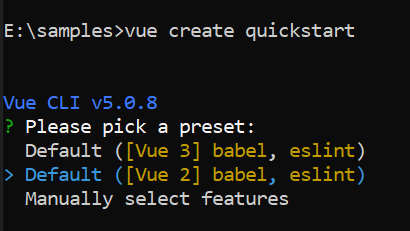How can I help you?
Getting Started with the Vue Spinner Component in Vue 2
10 Feb 20264 minutes to read
This article provides a step-by-step guide for setting up a Vue 2 project using Vue-CLI and integrating the Syncfusion® Vue Spinner component.
Prerequisites
System requirements for Syncfusion® Vue UI components
Setting up the Vue 2 project
To generate a Vue 2 project using Vue-CLI, use the vue create command. Follow these steps to install Vue CLI and create a new project:
npm install -g @vue/cli
vue create quickstart
cd quickstart
npm run serveor
yarn global add @vue/cli
vue create quickstart
cd quickstart
yarn run serveWhen creating a new project, choose the option Default ([Vue 2] babel, eslint) from the menu.

Once the quickstart project is set up with default settings, proceed to add Syncfusion® components to the project.
Add Syncfusion® Vue packages
Syncfusion® packages are available at npmjs.com. To use Vue components, install the required npm package.
This article uses the Vue Spinner component as an example. Install the @syncfusion/ej2-vue-popups package by running the following command:
npm install @syncfusion/ej2-vue-popups --saveor
yarn add @syncfusion/ej2-vue-popupsImport Syncfusion® CSS styles
Syncfusion® components require CSS stylesheets to display correctly. You can import themes in various ways, such as using CSS or SASS styles from npm packages, CDN, CRG, and Theme Studio. Refer to themes topic to learn more about built-in themes and different ways to reference themes in a Vue project.
In this article, the Material3 theme is applied using CSS styles, which are available in installed packages. The necessary Material3 CSS styles for the Spinner component and its dependents were imported into the <style> section of the src/App.vue file.
<style>
@import "../node_modules/@syncfusion/ej2-base/styles/material.css";
@import "../node_modules/@syncfusion/ej2-vue-popups/styles/material.css";
</style>The order of CSS imports matters. Import base styles first, then component-specific styles. Missing CSS imports can result in misaligned layouts, buttons without styling, or missing visual elements in popups and dialogs.
Add Syncfusion® Vue component
Follow the below steps to add the Vue Spinner component:
1. First, import and register the Spinner component in the script section of the src/App.vue file.
<script setup>
import { onMounted } from 'vue';
import { createSpinner, showSpinner, hideSpinner } from '@syncfusion/ej2-vue-popups';
</script><script>
import { createSpinner, showSpinner, hideSpinner } from '@syncfusion/ej2-vue-popups';
</script>Here is the summarized code for the above steps in the src/App.vue file:
<template>
<div id="app">
</div>
</template>
<script setup>
import { createSpinner, showSpinner, hideSpinner } from '@syncfusion/ej2-vue-popups';
import { onMounted } from 'vue';
onMounted(() => {
//createSpinner() method is used to create spinner
createSpinner({
// Specify the target for the spinner to show
target: document.getElementById('app')
});
// showSpinner() will make the spinner visible
showSpinner(document.getElementById('app'));
setInterval(function () {
// hideSpinner() method used hide spinner
hideSpinner(document.getElementById('app'));
}, 100000);
});
</script>
<style>
@import "../node_modules/@syncfusion/ej2-popups/styles/material.css";
</style><template>
<div id="app">
</div>
</template>
<script>
import { createSpinner, showSpinner, hideSpinner } from '@syncfusion/ej2-vue-popups';
export default {
name: 'app',
mounted: function () {
//createSpinner() method is used to create spinner
createSpinner({
// Specify the target for the spinner to show
target: document.getElementById('app')
});
// showSpinner() will make the spinner visible
showSpinner(document.getElementById('app'));
setInterval(function () {
// hideSpinner() method used hide spinner
hideSpinner(document.getElementById('app'));
}, 100000);
}
}
</script>
<style>
@import "../node_modules/@syncfusion/ej2-popups/styles/material.css";
</style>Run the project
To run the project, use the following command:
npm run serveor
yarn run serve